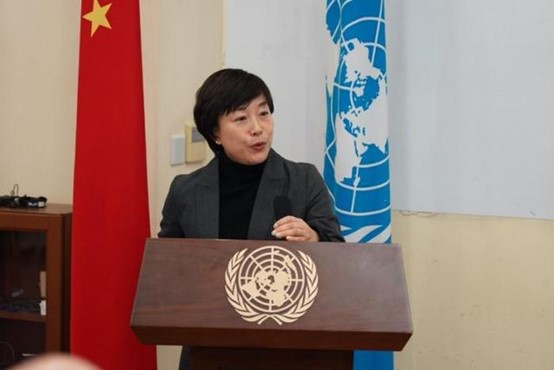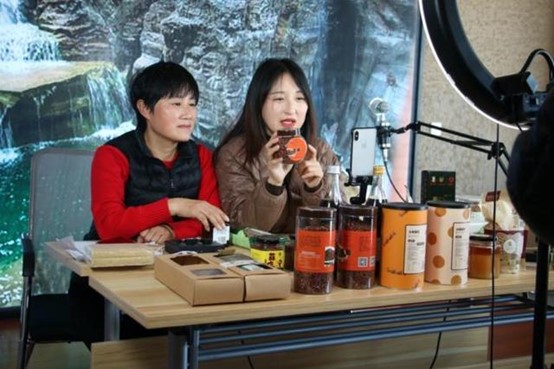
Alibaba rural vitalization commissioner Lin Donghong delivers a speech covering some of the ways e-commerce and digital technology help rural women in Pingshun County, Changzhi City, Shanxi Province, find new development opportunities and her experiences in this area at the Dialogue on Gender Equality and Women’s Empowerment in Achieving the SDGs [Sustainable Development Goals – the shared blueprint for peace and prosperity for people and the planet that constitutes the heart of the 2030 Agenda for Sustainable Development, which was adopted by all United Nations Member States in 2015 ] Through Promoting Women’s Participation in STEM, which was co-hosted by the United Nations in China and the Embassy of the United Arab Emirates in Beijing on Dec. 7, 2021.
A good example of an internet company that engages in global poverty reduction and rural vitalisation, the Alibaba Group established a poverty alleviation fund focused on education, health, women, ecology, and e-commerce designed to help create and implement a sustainable, inclusive, and imitable internet-oriented poverty alleviation model in December 2017. In May 2019, the company launched an undertaking known as the Poverty Alleviation Commissioner project and selected experienced employees to help impoverished people living in underdeveloped areas and provide them with development assistance using Alibaba’s resources. In 2021, Alibaba unveiled its Hometown Initiative, which promotes rural vitalisation through science and technology-oriented development, development of various industries, and the provision of training and guidance, as China began shifting its focus from poverty alleviation to rural vitalisation now that it had attained its poverty alleviation goals.
A total of 27 of Alibaba’s rural vitalization commissioners have introduced the company’s full-fledged digital operations experience, platform, and resources in 24 underdeveloped counties in 13 provinces across China as of the end of 2022, which has helped make it possible for them to implement the Internet Plus rural vitalisation development model. Internet Plus refers to an open-ended equation in which technologies such as cloud computing, big data, and the Internet of Things (IoT) are applied to industries and undertakings like manufacturing, commerce, banking, agriculture and rural development. Supporting e-commerce operations, conducting live commerce training, and building intelligent logistics centres has resulted in the remote mountainous areas that the commissioners have worked in becoming better-connected with the internet and their residents gaining access to useful training and education, which has made it possible for e-commerce to become an effective contributor to poverty alleviation and enabled senior farmers to become digital farmers and livestreaming influencers.
Alibaba rural vitalization commissioner Lin Donghong was dispatched to Pingshun in May 2021, which is the only county in north China’s Shanxi Province in which no coal mines existed at the time, after being selected from more than 1,000 applicants. She previously worked in the tourism industry for more than 20 years and had been spending 50 hours a year engaging in Alibaba’s philanthropic activities after obtaining an operations job in the company’s Feizhu Hotel Alliance division of its Fliggy travel-services platform several year ago.
Lin organised training courses covering live commerce – an approach to online sales that makes use of livestreaming technology and gives shoppers opportunities for real-time interaction – for more than 3,000 Pingshun residents and natives during her first 180 days in the county.
She noted in a speech she delivered at the Dialogue on Gender Equality and Women’s Empowerment in Achieving the SDGs Through Promoting Women’s Participation in STEM (science, technology, engineering and math), which was co-hosted by the United Nations in China and the Embassy of the United Arab Emirates in Beijing on Dec. 7, 2021, with participation from governments, research institutes, international organisations, the diplomatic community, and the private sector, that women account for more than 60% of the rural livestreaming hosts and 70% of the employment opportunities related to live commerce in the county.
Women’s equality and empowerment is one of the United Nations 17 Sustainable Development Goals (SDGs) – the shared blueprint for peace and prosperity for people and the planet that recognises that ending poverty and other deprivations must go hand-in-hand with strategies that improve health and education, reduce inequality, and spur economic growth while tackling climate change and working to preserve oceans and forests. The SDGs build on decades of work by countries and the UN and constitute the heart of the 2030 Agenda for Sustainable Development, which was adopted by all United Nations Member States in 2015.
Agricultural e-business owner Wang Yani and the members of the cooperative that she established are some of the Pingshun residents who have benefited from the efforts that Lin has made. Previously working as a counsellor at a secondary vocational school, Wang had been selling agricultural products online and eventually started engaging in live commerce with her mother in her hometown of Nanpo Village, Longxi Town. The then-25-year-old established her cooperative at the end of 2020, which boosted her e-business’s sales and helped make it possible for more than 120 residents of five villages in the area to increase their incomes. Lin provided live commerce training to Wang and the other members of her cooperative when she came to Pingshun in 2021, which helped them improve their skills and their profits.

Two e-commerce training participants practice engaging in live commerce during a session conducted at a facility in Pingshan.
In October 2021, Alibaba inaugurated an AI data annotation project in Pingshun. The first phase of the project resulted in more than 100 jobs becoming available to people who were born in or currently living in the county, 76% of whom were women and more than half of whom had returned to their hometowns from other areas after becoming aware of the endeavour in order to participate. The members of the team were able to review an average of 500 image annotations per person per day at first but were given the opportunity to participate in a month-long training course that resulted in the rate rising to nearly 3,000, with an accuracy rate of 99.9%.
Annotation reviewer Mu Wenhui enjoys a monthly income of nearly RMB3,000; access to China’s social security system, which consists of a pension (endowment insurance), medical insurance, unemployment insurance, maternity insurance, and work injury insurance; and a housing provident fund now that she is part of Alibaba’s Pingshun team. Wu has also gained the ability to easily take care of her children and elderly family members on her days off and in her other free time now that she is working in her hometown rather than as a migrant labourer. More than 20 mothers like her are currently part of the team that she works on.
“The experiences that have occurred in Pingshun reflect some of the new opportunities and outcomes that digital technology has facilitated in rural areas,” Lin also mentioned at the Dialogue on Gender Equality and Women’s Empowerment in Achieving the SDGs Through Promoting Women’s Participation in STEM. “Benefiting men and women equally, systematic training enables both left-behind women and people who return to their hometowns after working in other areas to quickly master a skill that makes it possible for them to survive and prosper.”
“It is important that [decent work] meets the emotional needs of rural women, including family commitments and friendship, enables them to participate in the global digital industrial upgrade, and ultimately enables them to experience the significance of being able to improve their lives through their own efforts in addition to generating incomes that are on par with local averages at minimum and enabling them to enjoy comprehensive social security,” she continued.
Alibaba continues to offer free e-commerce training in underdeveloped counties, cooperate with various public welfare organisations in order to provide rural women with various services, and implement AI labelling projects in underdeveloped counties in provinces such as Guizhou and Shaanxi so that impoverished women can find jobs in the areas that they are from, which contributes to SDGs such as SDG1: End[ing] poverty in all its forms everywhere, SDG5: Achiev[ing] gender equality and empower all women and girls, and SDG8: Promot[ing] sustained, inclusive, and sustainable economic growth, full and productive employment, and decent work for all.
![427aa6da-17fc-4382-b372-ba07d2bb479e[0].png 427aa6da-17fc-4382-b372-ba07d2bb479e[0].png](http://www.wfpchinacoe.net/pic/2023-04/04/85211548_ed0c1a9f-8ece-4325-9020-251c8903b039.png)
For more information, please contact WFP China COE (wfpcn.coe@wfp.org)
Category
Digital Technology Enables Rural Women to Obtain Decent Work in Pingshun County
Contributor
Digital Technology Enables Rural Women to Obtain Decent Work
Country
Story

